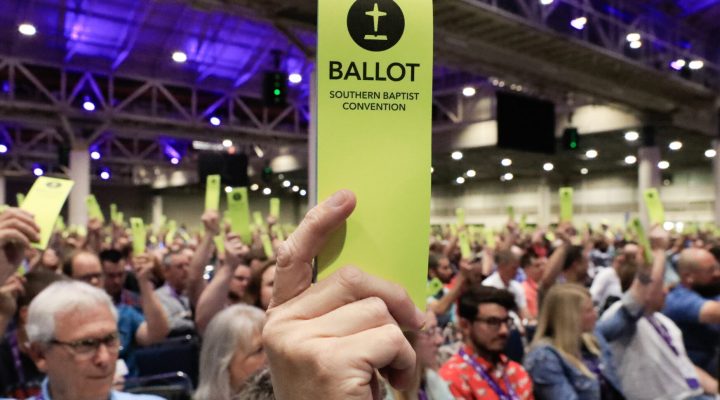Just how restrictive will the Southern Baptist Convention become if messengers to next summer’s SBC annual meeting approve a second reading of a proposed constitutional amendment against women in ministry? It depends on who’s doing the explaining.
One of the ongoing challenges of the so-called “Law Amendment” — named for its author, Virginia pastor Mike Law — is determining whether it will restrict only women with the title “pastor” or will extend to prohibitions on women teaching men in any setting.
The most extreme complementarians in SBC life believe not only in an all-male pastorate but in a gender hierarchy that precludes women from teaching men. This idea gained national attention several years ago when SBC complementarians turned on popular Bible teacher and author Beth Moore, who subsequently left the SBC and became Anglican.
The Law Amendment would add a new membership requirement in the SBC Constitution: “Does not affirm, appoint or employ a woman as a pastor of any kind.” Only churches may be affiliated with the SBC, so this requirement would apply to any church seeking to be in “friendly cooperation” with the denomination.
Internally, even some conservative Baptist leaders have said the language of the amendment is not clear and will lead to confusion. Proponents of the amendment say it is crystal clear.

Blake White
One of those advocates is Blake White, lead pastor at South Side Baptist Church in Abilene, Texas. He has posted a public letter online he has asked others to sign in solidarity. The letter is crafted as a “Plea to Southern Baptists.”
White says the proposed amendment counters cultural “confusion about gender and gender roles” and warns that “feminism is the air we breathe and has crept into too many of our churches.”
He cites four reasons to support the second reading of the Law Amendment: The Bible is clear, the Baptist Faith and Message is clear, Baptist history is clear, and the next generation of Southern Baptists needs to be safeguarded.
He cites the usual biblical texts to claim the New Testament prohibits women from pastoral leadership in churches — Titus 1:5-7, Acts 20:17 and 28, 1 Peter 5:1-2.
Then he asserts: “In God’s church, women are not to exercise authority over or teach men. Crystal clear. … We value the absolutely vital ways that women serve the kingdom of Christ. They can serve in a host of essential ways. Pastoral ministry is not one of them.”
“In God’s church, women are not to exercise authority over or teach men. Crystal clear.”
The Baptist Faith and Message, the SBC’s doctrinal statement, says, “The office of pastor/elder/overseer is limited to men as qualified by Scripture.” That belief must be upheld by all churches associated with the SBC, he contends. “Failing to settle this issue now will erode unity, demonstrate drift, and convey compromise.”
White also says Baptists always have insisted on only men serving as pastors — which is not historically accurate. He contends: “The reason the issue of female pastors is pressing now is not due to new biblical revelation or insight but churches caving to feministic cultural pressure.”
He finally appeals to the future: “Think of your great grandchildren’s SBC. We stand at a crucial moment on this issue. The slope is slippery. When we can make the Bible say the exact opposite of its plain reading, we can make it say anything. For the sake of truth, our confession, our churches, women, and the next generation, now is the time to get this right.”
White’s letter has drawn significant comment online, especially on the social media platform X, where SBC pastors and leaders are frequently in conversation.

Denny Burk
That conversation has been particularly robust on the X site called SBC Platform. Debate continues about just how strictly the Law Amendment would be applied. For example, could a female serve as a “children’s pastor” at an SBC church. And what about women teaching mixed-gender Bible study classes at an SBC church?
Also this week, one of the foremost leaders of the complementarian movement among Southern Baptists weighed in with an opinion piece published by Baptist Press, the SBC’s internal news service. That piece was written by Denny Burk, professor of biblical studies at Southern Seminary’s Boyce College and president of the Council on Biblical Manhood and Womanhood.
What the SBC is struggling to determine is “how the Baptist Faith and Message regulates our cooperation as Southern Baptists, particularly as it relates to women serving as pastors,” he says.
“Southern Baptist aren’t debating whether women may serve in church staff ministry positions. Of course, they can and do.”
There is “no little bit of misunderstanding” about “the precise issues in dispute,” he writes. “Southern Baptist aren’t debating whether women may serve in church staff ministry positions. Of course, they can and do, and I can’t think of any Southern Baptist who would say otherwise. Nor are Southern Baptists debating whether women should teach mixed-gendered Sunday school classes. That’s an interesting question that has been the subject of perennial debate, but it’s not something addressed by the Baptist Faith and Message and certainly not something requiring official action by the SBC. Nor is this debate about how to define complementarianism. The Baptist Faith and Message is our doctrinal statement, and it doesn’t even mention the term ‘complementarianism.’”
The issue, Burk says, is whether the Baptist Faith and Message “allows for women to be pastors and whether the Baptist Faith and Message “should be the basis for friendly cooperation within the SBC.”
On the latter point, some critics of the Law Amendment have said demanding uniformity on every point of the Baptist Faith and Message would lead to expelling many other churches for being out of line on other issues, including Communion practices and baptismal practices.
On the issue of women serving as pastors, there can be no middle ground, Burk says. “For example, some wish to rewrite the SBC’s governing documents so that women can serve as associate pastors but not senior pastors and so that cooperating churches might only have to adhere to part of the Baptist Faith and Message and not the whole Baptist Faith and Message.”
He concludes: “We are deciding right now who we are going to be as cooperating churches. Our debate really does come down to whether or not we believe the Bible allows for churches to call women as pastors and whether cooperating churches ought to be able to defy the Baptist Faith and Message. That is the bottom line, and I’m praying that Southern Baptists see that and choose wisely when we get to Indianapolis.”
Related articles:
Anti-egalitarian forces make clean sweep at SBC annual meeting
Saddleback and Fern Creek churches face off against Al Mohler at SBC meeting
Female pastors: Appointed or apostate? Southern Baptists decide | Opinion by Melody Maxwell
An open letter to all Southern Baptists | Opinion by Rick Warren
A primer on why Southern Baptists are fighting over women in ministry once again | Analysis by Mark Wingfield


